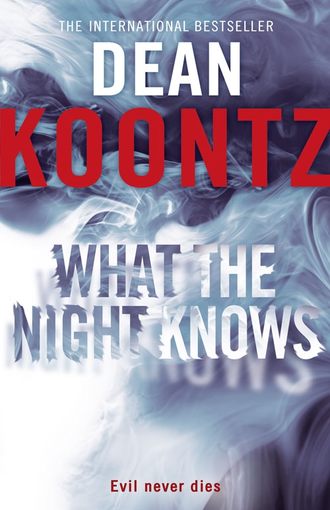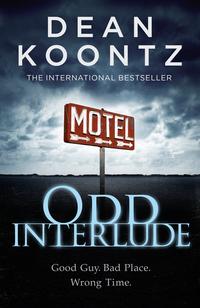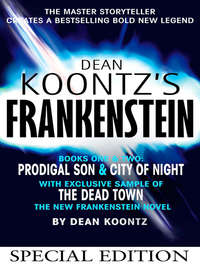
Полная версия
What the Night Knows
One of two windows in the study provided a view of the flagstone terrace and the deep backyard, which now lay in absolute darkness. Their house stood on a cul-de-sac, on a street that was a peninsula between two converging ravines, quiet and sequestered for an urban home. Beyond their back fence, the land dropped off steeply, into brush-choked woods. On the farther side of the ravine, the lights of other neighborhoods were smeared and faded by the rain. Between the study window and that distant glow, nothing could be seen: not the terrace or the lawn; not the arbor twined with climbing roses; not the great deodar cedar, its boughs drooping gracefully.
Although not remote, the house was sufficiently secluded to allow a rapist-murderer, hot with need and icy with determination, to come and play and go with little risk of being seen by neighbors.
Also out there in the dark lay Willard’s grave. City ordinances forbade the interment of animals on a residential lot unless they were cremated. An urn containing their beloved golden retriever’s ashes was buried under a black-granite plaque beyond the rose arbor.
The girls had suffered such grief at the loss that they remained reluctant to risk losing another. But perhaps the time had come to bring a new dog into their lives. Not a golden retriever who counted everyone his friend, but instead a breed with a greater reputation for aggressively protecting its family. Maybe a German shepherd.
At his desk, John switched on his computer and sat in thought for a minute before keying in the number for the state hospital. The voice-mail system offered options, although the reception desk and various offices were closed until eight in the morning. He pressed the number for psychiatric-ward security.
A man answered on the second ring.
John pictured the stark security vestibule on the third floor, where Coleman Hanes had taken him just the previous afternoon. He identified himself, learned that he was speaking with Dennis Mummers, and inquired if Billy Lucas had escaped.
“Where did you get that idea?” Mummers asked. “Nobody’s ever walked away from here, and I’d bet a year’s wages nobody ever will.”
“I assumed he didn’t have a phone. But I got a call from him.”
“Phone in his room? Of course he doesn’t.”
“If legal counsel wants to talk to him without coming out there, how is it done?”
“He’s fitted with restraints and taken to an obcon room that has a no-hands phone.”
“What’s obcon?”
“Observed-conference room. We watch him through a window, but it’s a privileged conversation, so we can’t hear what he’s saying. He’s in restraints and he’s watched to be sure he doesn’t pry anything out of the phone, anything sharp that might be a weapon.”
“He called me a little more than ten minutes ago,” John said. “On my home-office line. He must have gotten possession of a phone.”
Mummers was silent for a moment. Then: “What’s your number?”
John gave it to him.
“We’ll have to toss his room,” Mummers said. “Can I get back to you in half an hour?”
“I’ll be here.”
While he waited to hear from Dennis Mummers, John went online to a series of dot-gov sites, accessing information available to the public, but also restricted information that he could view only with his police pass code.
The need had arisen to confirm that Coleman Hanes was the man he appeared to be. John had given the state-hospital orderly the unlisted number that Billy Lucas had called, and he could think of no other way that the killer could have obtained it.
In minutes, he ascertained that the Marine Corps emblem tattooed on the palm of Hanes’s right hand was not in support of a fraudulent persona. The orderly served admirably in the Marine Corps, was decorated and honorably discharged.
Hanes had no criminal history in this state or in any state with which it shared information. Even his driving record was without a blemish.
The truth of military service and the lack of a police record did not clear him of having colluded with Billy Lucas, but it made the possibility less likely than it otherwise might have been.
When Dennis Mummers called back, he said, “Billy doesn’t have a phone. Are you certain it was him?”
“His voice was unmistakable.”
“It is distinct,” Mummers acknowledged. “But how often have you spoken with him before your visit here?”
Deflecting the question, John said, “He mentioned something to me that only he could know, related to my interview with him.”
“Did he threaten you?”
If John confirmed the threat, they would expect him to file a report, and if he did so, they would learn that he had no authority to involve himself in the Lucas case.
“No,” he lied. “No threat. What did Billy say when you searched his room for a phone?”
“He didn’t say anything. Something’s happened to him. He kind of cratered. He’s funked out, withdrawn, not talking at all to anyone.”
“Is there a chance maybe someone on the staff might have allowed him to use their cell phone?”
“Depending on the circumstances,” Dennis Mummers said, “that could be a reason for dismissal. No one would risk it.”
“In this work, Officer Mummers, I’ve learned some people will risk everything, everything, for the most trivial of reasons. But thank you for your assistance.”
After he hung up, John went to the kitchen, where he turned on just the light in the exhaust hood over the cooktop.
Most of their friends drank wine, but for the few with a taste for something stronger, they kept a small bar in a kitchen cabinet. Certain that he could get back to sleep only with assistance, he poured a double Scotch over ice.
He was disturbed less by the threat Billy Lucas had made than by the last words the murderous boy had spoken on the phone.
To the best of his recollection, John had never shared with the police any of what the murderer of his parents and sisters, Alton Turner Blackwood, had said before he died. John had been mute with grief and terror, but Blackwood had tried to distract him with talk.
The next-to-last thing Blackwood said on that long-ago night was word for word the last thing Billy said on the phone less than an hour earlier: Your lovely sister, your Giselle. She had such pretty little training-bra breasts.
Chapter 17
Zach dreamed that he woke in his dark bedroom and saw a blade of amber radiance slicing out of the closet, under the door. In the dream, he lay staring at this narrow brightness, trying to remember if he had extinguished the closet light before going to bed, and he decided that, yes, he had turned it off.
He switched on his nightstand lamp, which left most of the room still in shadows, and he got up from the bed and slowly approached the closet, behaving exactly like your typical bonehead in a brain-dead horror movie where everyone dies because everyone is terminally stupid. When he put his hand on the doorknob, the light in the closet went out.
Someone or some godawful thing had to be in there to operate the switch, so the worst of all dumb-ass moves would be to open the closet without having a weapon. Nevertheless, Zach watched his hand rotate the knob, as though he had no control over it, as though this also must be one of those movies in which a clueless dork undergoes a hand transplant and the hand has a mind of its own.
This was when he began to realize he was dreaming – because his hands were the same pair with which he’d been born, and they always did only what he intended them to do. With that fluid transitional dissolve common to dreams, he never opened the door, yet abruptly it stood wide, and he was poised on the threshold of the pitch-black closet.
Out of that lightless hole, enormous hands seized him, one by the throat, the other gripping his face, meaty palm crushing his nose, stoppering his mouth, his scream, his breath.
He seized the hand that cupped his face, frantic to break free, the wrist as massive as a horse’s hock, hard gnarl of bones, thick tendons. Cold, greasy fingertips bigger than soup spoons digging at his eyes, and no breath, no breath—
Sucking breath at last, Zach startled up in bed, the nightmare bursting away like a shattering shell.
The thunder of his heart pealed through him, but even as his dream fear quickly subsided from its peak, he saw that the fright-flick scenario of his sleep played out also in the waking world. In the true darkness of the real room, the blade of amber light knifed through the crack between the bottom of the door and the floor.
Earlier, when the door swung open on its own, he dismissed it as the house settling, the door out of plumb and moved by gravity. When it seemed, as an afterthought, that something had been wrong with his reflection when he saluted himself in the mirror, he didn’t dwell on it, didn’t hurry back to take a second look, because he recognized who were the actual-factual, sure-enough villains in the world and didn’t need bogeymen to distract him from worrying about real evil.
Some quality of the just-ended dream changed him. Suddenly he knew a kind of fear he hadn’t felt before, or maybe it was a kind that hadn’t rocked him in so long that his memory of it faded the same way that his memory of infancy had receded beyond recall.
Most nightmares were less ordeals than they were entertainments, infrequent rides through a funhouse of the mind. You drifted in your stupid gondola past one weird tableau after another until one of the horrors turned out to be real and the totally improbable chase was on. After a brief terror, you woke, and if you were able to remember the details, they were usually ridiculous and they made you laugh, just a brainless spookshow no scarier than the kind of half-assed monsters you’d find in a TV cartoon for little kids.
This freaking dream had felt as fully real as the room into which he awakened: the cold, greasy hardness of the assaulting hands; the pain of his nose pressed flat, nostrils pinched; the sense of suffocation. Even now, a lingering ache in his eyes suggested that the soup-spoon fingers had been real and would have gouged him blind if he hadn’t thrashed up from sleep.
He switched on the nightstand lamp and sprang out of bed, though not to rush the closet as the idiot Zach had done in the dream. In the corner near his desk stood a replica of a Mameluke sword, which he drew from a highly polished nickel-plated scabbard.
Modern-day Mamelukes were strictly for show, cool badges of rank carried by officers during ceremonies of various kinds. This one was stainless steel, the ricasso engraved, the quillon and the pommel handsomely gilded. And like any ceremonial sword, the edge was dull and useless as a weapon. The point wasn’t battle-sharp, either, but it could still do damage that the edge of the blade couldn’t.
Standing to the side of the closet, Zach threw open the door with his left hand, the Mameluke ready in his right. No assailant flew into the room to test the point of the sword.
The walk-in closet harbored no one, but it did hold a surprise. The ceiling trapdoor had been dropped, the folding ladder unfolded. Between the second and third floors, the dark crawlspace waited for him.
Zach hesitated at the base of the ladder, peering up, listening. He detected only the susurration of the ring burners in the two gas furnaces that heated the second and third floors, a hollow whispery sound like the roar of a waterfall heard from a great distance.
The crawlspace was actually a half floor, a five-foot-high service mezzanine, so you could almost stand erect. It housed the two furnaces, humidifiers, a few hundred feet of flexible ductwork running every which way, copper water lines, both iron and PVC drain pipes, and who the hell knew what. Just the farther side of the trap, you could switch on garlands of work lights, which were used whenever plumbers or electricians needed to go up there to perform periodic maintenance or to make repairs.
Little more than a month before, a geeky exterminator with bug eyes and a long mustache like insect antennae had climbed into the service mezzanine to search for signs of vermin. Instead of rats, he found a nest of squirrels that entered through a torn vent screen.
Nothing as innocent as a pack of squirrels had opened the trap and put down the ladder while Zach slept.
He didn’t lack the courage to search the space above; however, he would have to be the bonehead of all boneheads if he went up there at night with no weapon other than a cool but cumbersome dull-edged sword. He needed a good flashlight, too, because the strings of bare bulbs by which repairmen worked didn’t chase the shadows out of every corner. The following afternoon, after lessons and lunch, he might climb into the service space, have a look, poke around, see what he could see.
Maybe he would tell his father. They could search the mezzanine together.
With his left hand, Zach lifted the bottom of the ladder and folded back the lowest of four hinged sections, whereupon a clever automatic mechanism took over and accordioned the whole thing onto the back of the trapdoor, which swung up into place with a thump.
He stood in the closet for a while, until the pull-ring on the trapdoor rope stopped swinging like a pendulum, and then another minute or two. No one tried to put the ladder down again.
Exterior doors were kept locked even during the day. Dad said bad guys weren’t like vampires, they didn’t hide from the sun, they were up to no good 24/7, so you never did anything to make their work easier. No one could have sneaked inside and ascended to the mezzanine to hide.
More likely, the settling of the house that brought the closet door out of plumb was also to blame for this. Because of a slight shift in the structure, the weight of the ladder and gravity could have overpowered the spring-loaded closure, causing the trapdoor to drop open and the ladder to unfold on its own.
In fact, that must be exactly what had happened. Any other explanation was stupid kid stuff for gutless bed-wetters.
Before killing the closet light, he studied himself in the full-length mirror. He slept in briefs and a T-shirt. Although not superbuff, he wasn’t by any definition scrawny. Yet he appeared smaller than his image of himself. His legs seemed thin. Pink knees, pale feet. The sword was too big for him, perhaps for any thirteen-year-old. He didn’t look laugh-out-loud, bust-a-gut stupid, but he for sure didn’t look anything like a guy on a recruiting poster, either.
After turning off the closet light, he braced the door shut with his desk chair, although doing so embarrassed him a little.
He placed the sword on his bed and slipped beneath the covers, only his head and right arm exposed. His hand lay lightly on the hilt of the Mameluke.
For a few minutes, he considered the nightstand lamp, but at last he decided that leaving it aglow was what a spineless jellyfish would do, a fully wilted wimp. He had no fear of the dark. Zip, zero, nada. No fear of darkness itself, anyway.
With the lamp out and the gloom relieved only by the pale-gray rectangles of curtained windows and the clock-radio light, Zach became convinced that, as earlier in the night, something had not been right about his reflection. He assumed that he’d lie awake until morning and that before dawn he would figure out what troubled him, but after a while an avalanche of weariness overcame him. As he was carried down into sleep, he saw himself in the mirror, pale feet and pink knees and too-thin legs, all of that quite true and right even if dismaying. Then he realized that the eyes in his reflection were not gray-blue like his eyes really were, but black instead, as black as soot, as black as sleep.
Chapter 18
Barefoot and in a blue robe, sipping Scotch to foil insomnia, John paced the kitchen by the light of the stove hood, brooding about the events of the day. Sooner or later, he would have to share his suspicions with Nicky. But considering the bizarre and fantastic nature of what he would be asking her to believe, he wanted to lay out his case only when it seemed ironclad. They were as close as a husband and wife could be, committed to each other, with full trust in each other, but of course he could not tell her that invisible little creatures from Mars were living in the attic and expect her immediate belief even though she couldn’t see them.
So much of what happened during this past day could be dismissed as psychological phenomena arising from the profound emotional trauma of the murders that occurred twenty years before. In any homicide investigation or in a court of law, such evidence would be considered hearsay at best, delusional at worst.
The tiny ringing bells that he heard in the Lucas house could have been an auditory hallucination. Yes, he had found the calla-lily bells in Celine’s room, but no one had been there to ring them. He believed that, sitting at the desk in Billy’s room, he had heard the murderous boy’s cell tone, and he thought he had heard a faint voice say Servus, but without a witness to corroborate these experiences, they could have been auditory hallucinations, as well.
John knew that he had not imagined the recent call from Billy, and he assumed an investigation of telephone-company records would confirm an incoming call at the time he had received it. But nothing about Billy Lucas was apparently supernatural, nothing that supported the idea tormenting John: the possibility that Alton Turner Blackwood – his spirit or anima, or ghost, or whatever you wanted to call it – must be in the world once more, and must be somehow in the process of restaging the brutal murders he committed twenty years earlier, with the Calvino family as his fourth and final target.
The peculiar things he had seen were either in his peripheral vision or were arguably insignificant. While passing the print of John Singer Sargent’s Carnation, Lily, Lily, Rose on the staircase landing in the Lucas residence, he glimpsed – or thought he did – one of the little girls in the painting sprayed with blood, the next time set afire. He had to acknowledge that in his agitated state of mind, he could have imagined those manifestations in the image. And the digital clocks in the Lucas kitchen and in Billy’s room, suddenly flashing high noon or high midnight, were not irrefutable evidence that an entity from outside of time had been present; they were not evidence of anything.
Nicolette knew what had happened to John’s family and that he killed their murderer on that same night of monstrous evil. He had told her every detail of the event in order that she might understand the psychology – the anguish, the guilt, the quiet paranoia, the dread that lingered – of the man she intended to marry. He withheld from her only one thing, which he would have to reveal when and if he told her why he now feared for their lives.
Конец ознакомительного фрагмента.
Текст предоставлен ООО «ЛитРес».
Прочитайте эту книгу целиком, купив полную легальную версию на ЛитРес.
Безопасно оплатить книгу можно банковской картой Visa, MasterCard, Maestro, со счета мобильного телефона, с платежного терминала, в салоне МТС или Связной, через PayPal, WebMoney, Яндекс.Деньги, QIWI Кошелек, бонусными картами или другим удобным Вам способом.







